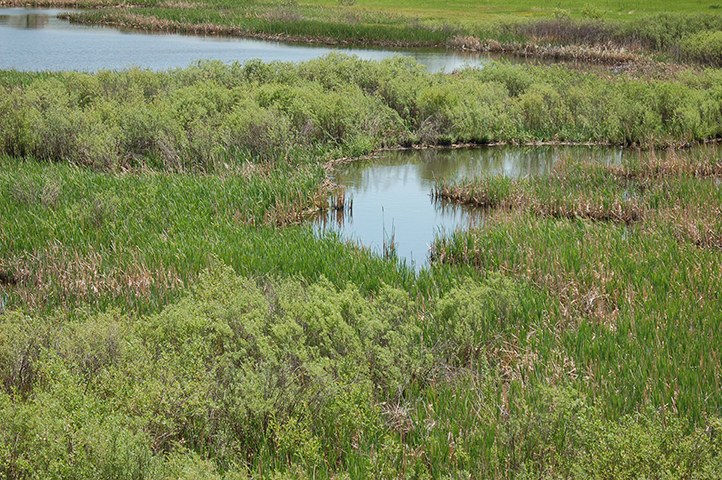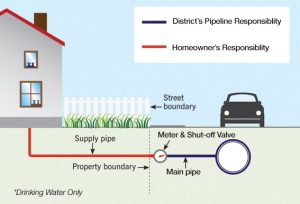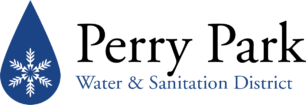
What is wastewater (sanitary sewer)?
Wastewater or sewage is the byproduct of many uses of water such as showering, dishwashing, laundry and flushing the toilet. After the water has been used, it enters the household’s wastewater pipeline and after it connects to the District’s main wastewater pipeline, the wastewater flows to one of Perry Park’s two, (Waucondah and Sageport), wastewater treatment plants.
Why does wastewater have to be treated?
Pollutants must be removed from the wastewater to help protect the environment and public health. When water is used in our community, the water becomes contaminated with human waste. If left untreated, these pollutants would negatively affect our health, water quality and environment.
Why are wastewater services always the same amount each bill?
It does not vary on bills because the District charges a flat bi-monthly fee that is the same for all residents.
Where does our wastewater go?
Wastewater is collected throughout the District and sent to one of two existing wastewater treatment plants through a series of pipelines. The Waucondah Wastewater Treatment Plant provides treatment service for wastewater collected in West Perry Park. The Sageport Wastewater Treatment Plant provides treatment service for wastewater collected in East Perry Park.
Where does the discharge from the wastewater treatment plants go?
The Waucondah Wastewater Treatment Plant (WWTP) discharges to Bear Creek, a tributary to West Plum Creek. The Sageport WWTP discharges to East Plum Creek.
Who maintains the wastewater service pipelines?
With the wastewater pipeline, the property owner is responsible for the wastewater pipeline form their home until it connects to the main sewer pipeline. That is why it’s so important to NEVER put any oils, fats, or grease down the drain or flush anything but human waste and toilet paper down the toilet.

What if I have sewer odor in my house?
Run fresh water in all sinks to fill traps inside the house as they may have dried out. If this does not cure the problem, check the toilets and make sure they are firmly attached to the floor. The wax seal around the toilet may be compromised. If this does not resolve the issue, call a plumber immediately. Sewer gas may be harmful if breathed over a period of time.
What is a main sewer (wastewater) line?
A main line is that larger pipe usually in the street, which carries sewer to one of Perry Park’s Wastewater Treatment Plants for purification.
How to Avoid Sewer Backups (what not to put down the drain)
How can we prevent a sewer backup in our home?
You can avoid a backup by NOT putting any fats, oils, or grease down the drain and ensure that no objects other than toilet paper and human waste are being flushed down toilets. You might also want to contact a plumber to assess your pipeline and drains. Plumbers can install backflow prevention devices, clean out existing pipes, and video your sewage pipeline all the way to where it connects to the District’s main sewage pipeline.
Who is responsible for the sewer (wastewater) pipeline maintenance?
It’s important to know that the sewer (wastewater) pipeline from the District’s main pipeline to and throughout the home is owned and maintained by the property owner. It’s at the point of connection (usually under the street) where the home pipeline connects to the wastewater main pipeline that the District takes over the responsibility for maintaining the wastewater pipeline.
What items should NEVER go down the drain or into a toilet?
Fats, oils, grease, meat drippings, wet wipes, lard, paint, medicine, salad dressing, solvents of any kind, sanitary pads, diapers, fertilizer, sanitary/wet wipes, cigarette butts should NEVER go down the drain or into the toilet. In other words, if it’s anything at all that is likely to contribute to your pipes getting clogged, put it in the trash, not down the drain.
Who cleans up a backup sewage mess in my home?
If a backup occurs in your home, it is your responsibility to clean up any damage from the backup. That’s why it is so important to let everyone in your home know not to flush and put down the drain harmful items such as fats, oil, grease, wet wipes, feminine protection items, etc.
Are there any insurance options to protect us from backup damage?
There are some insurance agencies that offer coverage for sewer and drain backups. Talk with your insurance agent to learn more.
What should we do if we have a sewer backup in our home?
- Check the toilets, sinks and drain pipes to clear any blockages to ensure that the water is not due to an internal plumbing problem. It’s important to know that a wastewater backup is contaminated and may contain a number of bacteria and viruses, which can affect your health.
- Try to carefully close as many drain openings as possible.
- Don’t run any more water, use the toilets or send any water down the drain as it will likely end up in your basement or lower levels of your home.
- Check with your neighbors to see if they are experiencing any backups. If they are, it is likely that it is a problem in the main sewage line. Contact the District immediately to report the problem.
- Call a plumber to assist with clearing the issue, closing any drains remaining open, and to assess your home’s internal issues.
- Contact your homeowner’s insurance to determine what coverage might be available.
How does the District maintain its main sewer (wastewater) pipeline?
Because of the size of the District’s collection system, one fifth of the sewer collection system is cleaned and inspected by video surveillance every year. The District uses high pressure water cleaning, tree root growth removal, and follows other points of inspection to ensure that our lines are clear of debris to keep the system running smoothly.
How do I dispose of hazardous household chemicals?
First, NEVER put them down the drain, toilet, or into the trash. To safely dispose of hazardous materials, call the Household Chemical Roundup Hotline for Douglas County 303-846-6249 or visit: Tri-County Health Department (
http://www.tchd.org/250/Home-Chemical-Waste) for further information. Here you can find out when they hold events where you can drop off hazardous household items.


